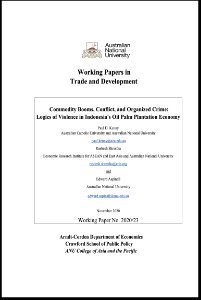Commodity Booms, Conflict, and Organized Crime: Logics of Violence in Indonesia's Oil Palm Plantation Economy
By Paul D. Kenny, Rashesh Shrestha, and Edward Aspinall
This paper examines the relationships between agrarian commodity booms and the incidence of group conflict and criminality in the context of Indonesia’s expanding oil palm sector. It theorizes that commodity boom violence takes two main forms: low level but organized criminal violence involved in the extortion of “rents” produced by a given commodity extraction and production process (extortion); and violent competition among a range of groups, including “mafias”, youth gangs, landholders, and commercial producers for control of these rents (competition). Extortion and competition violence are associated with distinct temporal distributions consistent with our theory. Criminality–especially theft–is higher in villages with established and productive oil palm plantations (extortion), whereas villages undergoing planation expansion have a higher incidence of group conflict (competition). Dynamic analyses utilizing panel data at the sub-district level support our causal interpretation, as the relationship between the area under oil palm cultivation and resource conflict (competition) changes over time and with prevailing commodity prices. Our results are robust to the use of instrumental variable analysis to account for the potential endogeneity of plantation expansion. Our theorized mechanism is given further support by a targeted primary survey of 1,920 respondents in oil palm producing and non-producing villages, which shows that villages experience different rates of extortion and competition violence depending both on if, and when, oil palm production commenced.
Canberra: Australian National University, 2020. 77p.


